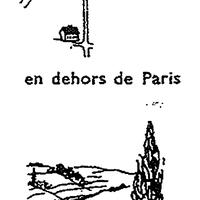6. Chapitre six
Sixième chapitre. La famille Leroux.
Mme Duclos a un frère. Son nom est M. Charles Leroux. C'est l'oncle des quatre enfants de M. et Mme Duclos. Sa femme, Mme Anne Leroux, est leur tante.
M. et Mme Charles Leroux ont deux enfants, un fils et une fille. Le nom de leur fils est Marcel ; le nom de leur fille est Monique. Marcel est le cousin de Jean, d'Henri, de Nicole et d'Yvonne, et Monique est leur cousine. M. Charles Leroux et sa famille ne demeurent pas dans la ville, mais en dehors de la ville ; ils demeurent à la campagne.
Jean et Henri, quel est le nom de votre oncle ? Jean et Henri : Le nom de notre oncle est M. Charles Leroux. M. Leroux, est-ce aussi l'oncle de vos soeurs Nicole et Yvonne ? Jean et Henri : oui, c'est aussi l'oncle de nos soeurs Nicole et Yvonne. Mme Leroux, est-ce votre tante ? Jean et Henri : Oui, c'est notre tante.
Combien votre mère a-t-elle de frères ? Jean et Henri : Elle a un frère : notre oncle Charles. Combien votre oncle et votre tante ont-ils d'enfants ? Jean et Henri : Ils ont deux enfants : Marcel et Monique. Marcel est notre cousin et Monique est notre cousine. Sont-ils aussi le cousin et la cousine de vos soeurs ? Jean et Henri : Oui, ils sont aussi le cousin et la cousine de nos soeurs.
Nicole et Yvonne, votre oncle et sa famille, demeurent-ils en ville ? Nicole et Yvonne : Non, ils demeurent en dehors de la ville ; ils demeurent à la campagne. Nicole et Yvonne, demeurez-vous aussi à la campagne ? Nicole et Yvonne : Non, nous ne demeurons pas à la campagne. Où demeurez-vous ? Nicole et Yvonne : Nous demeurons à Paris. Quelle langue parlez-vous ? Nicole et Yvonne : Nous parlons français. Quelle langue parlent vos frères ? Nos frères parlent aussi français. Combien de langues votre père parle-t-il ? Notre père parle trois langues ; il parle français, anglais et allemand.
Jean et Henri, votre mère, a-t-elle deux frères ? Jean et Henri : Non, elle n'a qu'un frère. Votre père, a-t-il aussi un frère ? Jean et Henri : Non, il n'a pas un frère, mais une soeur. Combien de soeurs avez-vous, Jean et Henri ? Jean et Henri : Nous avons deux soeurs. Combien de cousins avez-vous ? Jean et Henri : Nous avons qu'un cousin ; c'est Marcel. Quel âge a votre cousin Marcel ? Il a quatorze ans. Combien d'enfants y a-t-il dans la famille de votre oncle ? Il n'y a que deux enfants dans la famille de notre oncle. Nicole et Yvonne, êtes-vous les cousines de Marcel et de Monique ? Nicole et Yvonne : Oui, nous sommes leurs cousines. Yvonne, est-tu plus âgée que ta cousine ? Yvonne : Non, je ne suis pas plus âgée que ma cousine. Quel âge as-tu ? Yvonne : J'ai cinq ans. Et quel âge a Monique ? Yvonne : Elle a douze ans. As-tu le même nom de famille que ton cousin et ta cousine ? Yvonne : Non, je n'ai pas le même nom de famille que mon cousin et ma cousine. Leur nom de famille est Leroux ; ce sont les enfants de mon oncle, M. Leroux. Mon nom de famille est Duclos ; je suis la fille de M. Duclos.
Jean, es-tu Anglais ou Français ? Jean : Je suis Français. As-tu un cousin anglais ? Jean : Non, mais j'ai un cousin français. Nicole et Yvonne combien de frères avez-vous ? Nicole et Yvonne : Nous avons deux frères. Qui sont vos frères ? Nicole et Yvonne : Nos frères, ce sont Jean et Henri. Combien d'enfants êtes-vous dans votre famille ? Nicole et Yvonne : Nous sommes quatre enfants dans notre famille.

